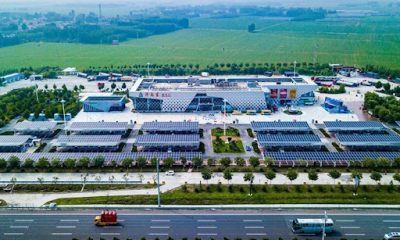News
Digital technologies contribute to healthy development of China’s anti-counterfeiting industry
By Ye Zi
As new anti-counterfeiting technologies keep emerging over the recent years, digital solutions have been widely applied in the anti-counterfeiting of products, tickets and certificates, which contribute to the sustainable and healthy development of the Chinese anti-counterfeiting industry.
For instance, each book under the protection of a book anti-counterfeiting and track & trace system has its unique identity information; tea brands are employing block chain, QR codes, miniature texts and images as well as VOID labels to fight fakes; manufacturers of dietary supplements have labeled their products with scratch-off anti-counterfeiting stickers with QR codes, which prove the authenticity of the products.
In China, a laser hologram label and a QR code can be found on each bag of edible salt sold on the market. To obtain product authenticity information and track the production and circulation of the salt, all a consumer needs to do is to scan the QR code.
Over the recent years, the China Salt Association has been requesting producers of edible salt to upload the information of every bag of salt they produce onto a national edible salt tracing service platform the association established, so that the origin and circulation of the salt can be tracked, and responsible parties would be called to account once problems happen.
Brand value has been considered increasingly important as market economy develops in China. However, it is also triggering illegal activities.
According to an official with the China Trade Association for Anti-counterfeiting, products made by renowned manufacturers and come with high market shares and profitability are always counterfeited. For example, some generic brands of milk powder are selling their products with a strategy of copycat packaging, and adulterated alcohol is sold in recycled bottles of renowned liquors.
Today, these counterfeiting methods can barely exist any longer as more and more anti-counterfeiting technologies are developed.
The Fujian branch of Quantum Cloud Code, a Shenzhen-based provider of enterprise digitalization solutions, has developed an anti-counterfeiting and track & trace system for international smart bathroom brand JOMOO. Thanks to the system, every kitchen and bathroom accessory produced by JOMOO comes with an anti-counterfeiting label that is extremely difficult to be duplicated. More importantly, the label still can be read an show authenticity information even 90 percent of it is worn out.
Insiders believe that anti-counterfeiting labels and QR codes adopted by enterprises have well regulated market competition.
Today, anti-counterfeiting remains an important method to safeguard fair competition in the market and plays a unique and irreplaceable role in protecting brands and intellectual property rights, in protecting the rights and interests of enterprises and consumers, and in building the social credit system.
An official with the China Trade Association for Anti-counterfeiting told People’s Daily that China is currently home to more than 1,200 enterprises engaged in the anti-counterfeiting industry, which generate a total output of more than 150 billion yuan ($20.96 billion) and produce over 360 billion anti-counterfeiting labels each year.
These labels are used by hundreds of thousands of brands and enterprises on a wide range of products, such as liquors & tobaccos, edible salt, farm produce, food, medicines, agricultural supplies, child care supplies, cosmetics, leatherware, clothes, electronics and home appliances, auto parts, construction materials and furniture.
News
TCN Acknowledges 7th Grid Collapse in 2024

The Transmission Company of Nigeria (TCN) has reported its seventh partial grid collapse in 2024. Despite the recurring issue, TCN’s General Manager of Public Affairs, Ndidi Mbah, reassured the public that efforts to restore power are well underway, with about 90% of substations receiving bulk power.
Mbah noted that the Azura Power Station initiated the grid recovery, although a minor setback occurred. However, power supply has been restored to the Abuja region and other key distribution centers. The Ibom Gas Generating Station remained unaffected, continuing to supply power to the South-South region.
An investigation into the cause of the collapse will commence once full grid restoration is achieved.
News
Jigawa Tanker Tragedy: Shettima, First Lady Mourn Victims, Pledge Federal Support

Vice President Kashim Shettima has expressed deep sorrow over the tragic tanker explosion in Jigawa State, which claimed over 100 lives. In a statement issued by his media aide, Stanley Nkwocha, Shettima, on behalf of President Bola Tinubu, extended condolences to the affected families, praying for strength and comfort in their time of grief.
Shettima assured the public that the federal government is mobilizing resources to support the injured and assist those affected. He has directed the immediate deployment of the National Emergency Management Agency (NEMA) to provide aid. The Vice President also stressed the need for a review of fuel transportation safety protocols to prevent future incidents.
In a separate statement, First Lady Oluremi Tinubu offered her condolences to Jigawa Governor Umar Namadi and the people of Jigawa, praying for peace and comfort for the families affected. She called the incident “unfortunate” and extended prayers for the recovery of the injured and the repose of the souls lost in the tragedy.
News
Nigeria Customs Intercepts Arms, Ammunition Worth N9.5bn Over Six Years

The Nigeria Customs Service (NCS) has revealed that it intercepted a total of 10,598 pieces of arms and 114,929 rounds of ammunition valued at N9.58 billion over the past six years. Comptroller General of Customs, Bashir Adewale Adeniyi, made this disclosure during a press conference on enforcement activities in Zone A.
Adeniyi highlighted that 60% of these seizures occurred in 2023, reflecting the Customs’ increased efforts to curb arms smuggling. He also mentioned that recent operations such as Operation Whirlwind and Operation Swift Sting are part of a strategic response to tackle evolving smuggling tactics.
In addition to arms seizures, the Customs CG announced the largest pangolin scale seizure since 2020, with 9,493 kg of scales confiscated in collaboration with the Wildlife Justice Commission. The joint operation led to four arrests across Kano, Kaduna, and Lagos. The NCS continues to intensify efforts against wildlife trafficking, targeting supply routes in northern Nigeria and border areas.
-

 Business14 hours ago
Business14 hours agoOkpella Monarch: Obaseki Ratified Kingmakers Decision, End 5years leadership Vacuum
-

 Banking10 hours ago
Banking10 hours agoFree Food Saga: Akpabio quoted out of context-CSO
-

 Foreign15 hours ago
Foreign15 hours agoSci-tech innovation fuels China’s high-quality development
-

 Entertainment7 hours ago
Entertainment7 hours agoDavido Declares ‘Timeless’ His Best Album
-

 Entertainment7 hours ago
Entertainment7 hours ago‘Adire’ Secures Four Nominations at the Best of Nollywood Awards
-

 Business7 hours ago
Business7 hours agoWike Urges Nigerians to Pay Taxes for Improved Social Services
-

 Foreign9 hours ago
Foreign9 hours agoQinling Mountains better safeguarded with comprehensive digital platform
-

 Foreign9 hours ago
Foreign9 hours agoExpressway service station in Shandong achieves carbon neutrality






